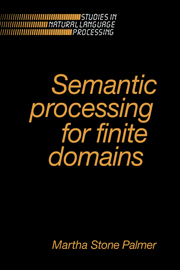4 - Inference-driven mapping
Published online by Cambridge University Press: 24 November 2009
Summary
This chapter presents the semantic processor that performs the semantic role assignments at the same time as it is decomposing the verb representation. Chapter 3 has described how semantic roles are defined as arguments to the semantic predicates that appear in the lexical entries. These arguments are instantiated as the lexical entries are interpreted. A possible instantiation of a predicate-argument is the referent of a syntactic constituent of the appropriate syntactic and semantic type. The syntactic constituent instantiations correspond to the desired mappings of syntactic constituents onto semantic roles. Other instantiations can be made using pragmatic information to deduce appropriate fillers from previous knowledge about other syntactic constituents or from general world knowledge.
These tasks are performed by interpreting the lexical entries procedurally similarly to the way that Prolog interprets Horn clauses procedurally [Kowalski, 1979]. The lexical entries are in fact Horn clauses, and the predicate-arguments that correspond to the semantic roles are terms that consist of function symbols with one argument. The procedural interpretation drives the application of the lexical entries, and allows the function symbols to be “evaluated” as a means of instantiating the arguments. The predicate environments associated with the mapping constraints correspond to states that may or may not occur during the procedural interpretation of the entries. Thus the same argument can be constrained differently depending on the state the verb interpretation is in. The state can vary according to instantiations of arguments or by the predicates included in the predicate decomposition.
- Type
- Chapter
- Information
- Semantic Processing for Finite Domains , pp. 111 - 147Publisher: Cambridge University PressPrint publication year: 1990



